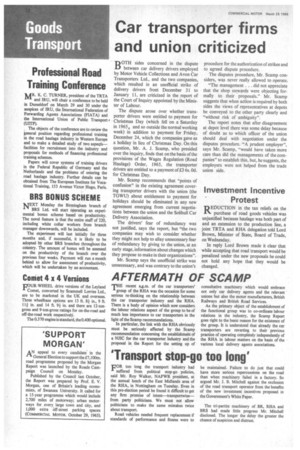Car transporter firms and union criticized
Page 24

If you've noticed an error in this article please click here to report it so we can fix it.
BOTH sides concerned in the dispute between car delivery drivers employed by Motor Vehicle Collections and Avon Car Transporters Ltd., and the two companies, which resulted in an unofficial strike of delivery drivers from December 31 to January 11, are criticized in the report of the Court of Inquiry appointed by the Minister of Labour.
The dispute arose over whether transporter drivers were entitled to payment for ' Christmas Day (which fell on a Saturday in 1965, and so outside the normal working week) in addition to payment for Friday, December 24, which the companies gave as a holiday in lieu of Christmas Day. On this question, Mr. A. J. Scamp, who presided over the inquiry, finds that on the basis of the provisions of the Wages Regulation (Road Haulage) Order, 1965, the transporter drivers are entitled to a payment of £3 6s. Od. for Christmas Day.
Mr. Scamp recommends that "points of confusion" in the existing agreement covering transporter drivers with the union (the TGWU) about entitlement to payment for holidays should be eliminated in any new agreement emerging from current negotiations between the union and the Solihull Car Delivery Association.
The drivers' fear of redundancy was not justified, says the report, but "the two companies may wish to consider whether they might not help to allay unnecessary fear of redundancy by giving to the union, at an early stage, information about changes which they propose to make in their organizations".
Mr. Scamp says the unofficial strike was unnecessary, and was contrary to the union's procedure for the authorization of strikes and to agreed dispute procedure.
The disputes procedure, Mr. Scamp considers, was never really allowed to operate.
"The management . . . did not appreciate that the shop stewards were objecting formally to their proposals." Mr. Scamp suggests that when action is required by both sides the views of representatives at depots be conveyed to the other party clearly and "without risk of ambiguity".
The report notes that after disagreement at depot level there was some delay because of doubt as to which officer of the union should deal with negotiation under the disputes procedure. "A prudent employer", says Mr. Scamp, "would have taken more care than did the managements of the companiesto establish this, but, he suggests, the employers were not helped from the trade union side.




















































































































